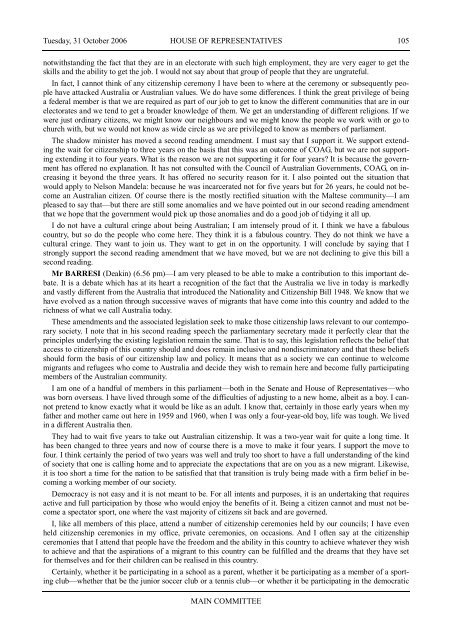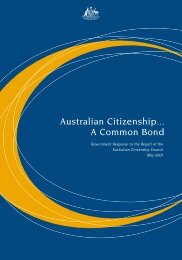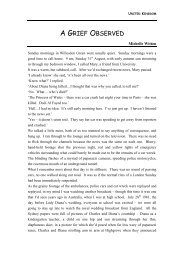HOUSE OF REPRESENTATIVES - The Southern Cross Group
HOUSE OF REPRESENTATIVES - The Southern Cross Group
HOUSE OF REPRESENTATIVES - The Southern Cross Group
You also want an ePaper? Increase the reach of your titles
YUMPU automatically turns print PDFs into web optimized ePapers that Google loves.
Tuesday, 31 October 2006 <strong>HOUSE</strong> <strong>OF</strong> <strong>REPRESENTATIVES</strong> 105<br />
notwithstanding the fact that they are in an electorate with such high employment, they are very eager to get the<br />
skills and the ability to get the job. I would not say about that group of people that they are ungrateful.<br />
In fact, I cannot think of any citizenship ceremony I have been to where at the ceremony or subsequently people<br />
have attacked Australia or Australian values. We do have some differences. I think the great privilege of being<br />
a federal member is that we are required as part of our job to get to know the different communities that are in our<br />
electorates and we tend to get a broader knowledge of them. We get an understanding of different religions. If we<br />
were just ordinary citizens, we might know our neighbours and we might know the people we work with or go to<br />
church with, but we would not know as wide circle as we are privileged to know as members of parliament.<br />
<strong>The</strong> shadow minister has moved a second reading amendment. I must say that I support it. We support extending<br />
the wait for citizenship to three years on the basis that this was an outcome of COAG, but we are not supporting<br />
extending it to four years. What is the reason we are not supporting it for four years? It is because the government<br />
has offered no explanation. It has not consulted with the Council of Australian Governments, COAG, on increasing<br />
it beyond the three years. It has offered no security reason for it. I also pointed out the situation that<br />
would apply to Nelson Mandela: because he was incarcerated not for five years but for 26 years, he could not become<br />
an Australian citizen. Of course there is the mostly rectified situation with the Maltese community—I am<br />
pleased to say that—but there are still some anomalies and we have pointed out in our second reading amendment<br />
that we hope that the government would pick up those anomalies and do a good job of tidying it all up.<br />
I do not have a cultural cringe about being Australian; I am intensely proud of it. I think we have a fabulous<br />
country, but so do the people who come here. <strong>The</strong>y think it is a fabulous country. <strong>The</strong>y do not think we have a<br />
cultural cringe. <strong>The</strong>y want to join us. <strong>The</strong>y want to get in on the opportunity. I will conclude by saying that I<br />
strongly support the second reading amendment that we have moved, but we are not declining to give this bill a<br />
second reading.<br />
Mr BARRESI (Deakin) (6.56 pm)—I am very pleased to be able to make a contribution to this important debate.<br />
It is a debate which has at its heart a recognition of the fact that the Australia we live in today is markedly<br />
and vastly different from the Australia that introduced the Nationality and Citizenship Bill 1948. We know that we<br />
have evolved as a nation through successive waves of migrants that have come into this country and added to the<br />
richness of what we call Australia today.<br />
<strong>The</strong>se amendments and the associated legislation seek to make those citizenship laws relevant to our contemporary<br />
society. I note that in his second reading speech the parliamentary secretary made it perfectly clear that the<br />
principles underlying the existing legislation remain the same. That is to say, this legislation reflects the belief that<br />
access to citizenship of this country should and does remain inclusive and nondiscriminatory and that these beliefs<br />
should form the basis of our citizenship law and policy. It means that as a society we can continue to welcome<br />
migrants and refugees who come to Australia and decide they wish to remain here and become fully participating<br />
members of the Australian community.<br />
I am one of a handful of members in this parliament—both in the Senate and House of Representatives—who<br />
was born overseas. I have lived through some of the difficulties of adjusting to a new home, albeit as a boy. I cannot<br />
pretend to know exactly what it would be like as an adult. I know that, certainly in those early years when my<br />
father and mother came out here in 1959 and 1960, when I was only a four-year-old boy, life was tough. We lived<br />
in a different Australia then.<br />
<strong>The</strong>y had to wait five years to take out Australian citizenship. It was a two-year wait for quite a long time. It<br />
has been changed to three years and now of course there is a move to make it four years. I support the move to<br />
four. I think certainly the period of two years was well and truly too short to have a full understanding of the kind<br />
of society that one is calling home and to appreciate the expectations that are on you as a new migrant. Likewise,<br />
it is too short a time for the nation to be satisfied that that transition is truly being made with a firm belief in becoming<br />
a working member of our society.<br />
Democracy is not easy and it is not meant to be. For all intents and purposes, it is an undertaking that requires<br />
active and full participation by those who would enjoy the benefits of it. Being a citizen cannot and must not become<br />
a spectator sport, one where the vast majority of citizens sit back and are governed.<br />
I, like all members of this place, attend a number of citizenship ceremonies held by our councils; I have even<br />
held citizenship ceremonies in my office, private ceremonies, on occasions. And I often say at the citizenship<br />
ceremonies that I attend that people have the freedom and the ability in this country to achieve whatever they wish<br />
to achieve and that the aspirations of a migrant to this country can be fulfilled and the dreams that they have set<br />
for themselves and for their children can be realised in this country.<br />
Certainly, whether it be participating in a school as a parent, whether it be participating as a member of a sporting<br />
club—whether that be the junior soccer club or a tennis club—or whether it be participating in the democratic<br />
MAIN COMMITTEE




